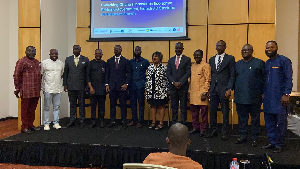 The event brought together government officials, regulators, entrepreneurs, and venture capitalists
The event brought together government officials, regulators, entrepreneurs, and venture capitalists
The First Deputy Governor of the Bank of Ghana, Dr Zakari Mumuni, has reaffirmed the central bank’s commitment to fostering responsible innovation as a catalyst for financial inclusion.
He urged stronger collaboration between regulators, startups, and policymakers to unlock Ghana’s economic potential.
Speaking at the AyaHQ Public-Private Sector Roundtable in Accra on June 25, 2025, Dr Mumuni highlighted the Bank’s proactive stance on emerging financial technologies such as digital assets, open banking, and the e-Cedi. These innovations, he said, are being developed to promote safe, inclusive, and efficient financial ecosystems.
“Ghana is witnessing rapid digitalisation in financial services — from mobile money to AI-enabled platforms — and the Bank of Ghana is ensuring this growth occurs within a robust, risk-managed framework,” he stated.
He cited key interventions, including the Payment Systems and Services Act (2019), the establishment of a regulatory sandbox for FinTechs, and the deployment of supervisory intelligence tools like ORASS and the Financial Industry Command Security Operations Centre (FICSOC).
Dr Mumuni also emphasized that financial innovation must not undermine system stability.
“We’re not just encouraging innovation for its own sake. We’re building the regulatory architecture to manage cyber risks, money laundering, and ensure consumer protection — while still providing room for bold experimentation,” he noted.
He revealed that the Bank is exploring next-generation digital infrastructure projects, including Universal Trusted Credentials (UTCs) and Digital Economy Semi-Fungible Tokens (DESFTs), aimed at expanding access to cross-border trade and financing opportunities, especially for Ghanaian SMEs.
Dr Mumuni concluded his remarks with an open invitation to innovators and startups:
“The Bank of Ghana will continue to engage and support Ghana’s startup ecosystem in order to push the frontiers of financial digitisation. This is a journey we must take together.”
The roundtable, themed “Unlocking Economic Opportunity Through Innovation: Bridging Startups, Policy, and Capital in Ghana,” brought together government officials, regulators, entrepreneurs, and venture capitalists to co-create a vision for an innovation-led Ghanaian economy.
The Ministry of Communication, Digital Technology, and Innovations pledged renewed support for Ghana’s startup and innovation ecosystem, highlighting ongoing legislative reforms, youth digital training initiatives, and calls for deeper collaboration between the public and private sectors.
Delivering remarks on behalf of the Minister, Samuel Nartey George, Director of Innovations Emmanuel Ofori stated that Ghana’s future prosperity hinges on “our ability to harness ideas, mobilise capital, and empower our people — especially the youth.”
He spotlighted the Ministry’s flagship One Million Coders Programme, which aims to equip one million young Ghanaians with coding and digital skills.
“We’ve already piloted training for 560 youth, maintaining a deliberate 50-50 gender balance,” Ofori said. “This is about preparing our youth for global opportunities.”
Ofori also outlined key policy efforts, including the Ghana Innovation and Startup Act, a National AI Strategy, and a Data Harmonisation Bill, all aimed at building a future-ready regulatory environment.
“We are creating a legal and policy foundation that encourages innovation, protects consumers, and attracts investors. Ghana is open for business, and we welcome partnerships that are fair, transparent, and built on mutual respect.”
Eric Annan, founder of AyaHQ, called for the creation of Special Innovation Economic Zones in Ghana — regulation-enabled hubs designed to incubate startups focused on AI, climate tech, decentralised identity, and digital finance.
“Ghana has the raw material — its people. But ideas alone are not enough. We need enabling policy, catalytic capital, and aligned partnerships to scale these innovations,” Annan said.
“Let us not just be inspired today; let us align to act.”
He revealed that since its founding in 2021, AyaHQ has:
Trained over 300 young Africans in cutting-edge fields such as smart contract engineering and product management,
Incubated more than 30 startups operating across 30 countries, and
Built two innovation hubs — in Ghana and Kenya.
AM/KA
Ever heard of Nkofie, the legendary Kwahu cave believed to grant wishes? Join GhanaWeb’s People & Places as we take you on an exclusive tour of this mystical site:
